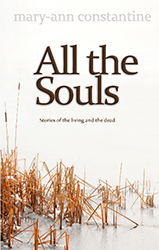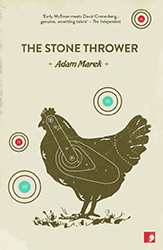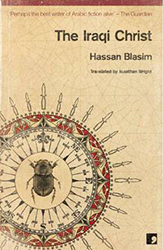All the Souls, Mary-Ann Constantine (Seren),
The Stone Thrower, Adam Marek (Comma Press)
The Polish Boxer, Eduardo Halfon (Pushkin Press)
The Iraqi Christ, Hassan Blasim (Comma Press)
 Ceredigion based Mary-Ann Constantine’s lovely, purgatorial stories in All the Souls are possessed of a quiet, often understated or hidden beauty, like the undersides of leaves. They inhabit the liminal world between this one and the next and have a deliciously lingering, let’s call it a genuinely haunting effect.
Ceredigion based Mary-Ann Constantine’s lovely, purgatorial stories in All the Souls are possessed of a quiet, often understated or hidden beauty, like the undersides of leaves. They inhabit the liminal world between this one and the next and have a deliciously lingering, let’s call it a genuinely haunting effect.
The opening novella ‘The Collectors’ tells of the Anaon, the collective name for a vast population of penitential souls, which can be seen – in the right light or by a properly attuned and sensitive observer – all around us in nature, hanging by the millions from branches of willow and alder. This long tale also depicts a quest through late nineteenth century France to find the last of the remaining lepers. Conventional it is not, yet the sure and palpable sense of history (as one might expect from a specialist in Romantic era literature) is there in the language, which is often very matter-of-fact, never frilly or nonsensical, and perfectly exact when it needs to be. Constantine often interlaces Breton songs or old Welsh rhymes into the prose, adding quiet lilts and slightly forlorn echoes of long-ago voices.
There are slightly more conventional ghosts drifting through some of the other tales – if ghosts can ever be conventional – from the male ghost only visible though a camera obscura, through an animal-shaped poltergeist which shakes up a house like the wind to a monk, or early Christian saint called Cewydd who appears on the banks of the Wye.
The effect of reading them all in a single sitting is a bit like attending a entirely believable seance, blending the chimeric with the desired, the corporeal with the ectoplasmic, the pieces on the ouija board moving as if unbidden, yet, as it transpires, perfectly controlled.
 Adam Marek stakes his claim to an even weirder part of the territory. His second collection, The Stone Thrower, deservedly shortlisted for this year’s Edge Hill Prize, is the product of a febrile and hyper-fecund imagination, where the oddest and most unexpected things intrude into or erupt out of day-to-day life. In the title tale, for instance a man staying in a holiday let with his family witnesses a young boy throwing stones at the chickens outside, and doing so with perfect, fatal accuracy. The tone of the story is chilling because it is so matter-of-fact and unadorned, which makes the ending, where the target changes, one to rob the reader of a heartbeat. Similarly, in a tale called ‘The Captain’ there is something frighteningly ordinary about a lorry delivery, which turns out to be about dumping heaps of human bodies, which becomes even more disturbing for never being fully explained. In another story a seemingly mundane event, a bee sting turns into a terrifying scenario when it turns out the child who’s been stung has a fatal allergy to bee poison. And they’re a long, long way away from help.
Adam Marek stakes his claim to an even weirder part of the territory. His second collection, The Stone Thrower, deservedly shortlisted for this year’s Edge Hill Prize, is the product of a febrile and hyper-fecund imagination, where the oddest and most unexpected things intrude into or erupt out of day-to-day life. In the title tale, for instance a man staying in a holiday let with his family witnesses a young boy throwing stones at the chickens outside, and doing so with perfect, fatal accuracy. The tone of the story is chilling because it is so matter-of-fact and unadorned, which makes the ending, where the target changes, one to rob the reader of a heartbeat. Similarly, in a tale called ‘The Captain’ there is something frighteningly ordinary about a lorry delivery, which turns out to be about dumping heaps of human bodies, which becomes even more disturbing for never being fully explained. In another story a seemingly mundane event, a bee sting turns into a terrifying scenario when it turns out the child who’s been stung has a fatal allergy to bee poison. And they’re a long, long way away from help.
The stories are sometimes set in the future, where humanized orangutans work palm oil plantations in Banau Batong, or enter the world of computer games, but there is one theme, an undertow of anxiety if you like, running throughout this collection: a parent’s or parents’ concern for their offspring. The closing story, ‘Earthquakes,’ couched as a charity appeal letter, is a tough read if you are a parent, especially one who doesn’t always look at such letters when they arrive with the Sunday broadsheets. Tough, yes, but deeply human, too. Marek is a moral man of good heart with an exceedingly troubling talent, generating prose which skews the world and unsettles and ultimately skewers the reader.
 I was, am and suspect I will continue to be besotted with the work of Eduardo Halfon. In his debut collection, The Polish Boxer, this über-talented Guatemalan author (whose work often brings to mind the work of Junot Diaz) blurs the thin charcoal line between short story and memoir, with a central character called Eduardo Halfon, in search of the truth behind his Jewish grandfather’s tatoo, or on the trail of a gypsy pianist. This musician is a man worth seeking down, for his music haunts the prose of this corruscatingly well written first book:
I was, am and suspect I will continue to be besotted with the work of Eduardo Halfon. In his debut collection, The Polish Boxer, this über-talented Guatemalan author (whose work often brings to mind the work of Junot Diaz) blurs the thin charcoal line between short story and memoir, with a central character called Eduardo Halfon, in search of the truth behind his Jewish grandfather’s tatoo, or on the trail of a gypsy pianist. This musician is a man worth seeking down, for his music haunts the prose of this corruscatingly well written first book:
The first time I heard Milan Rakić play was a few years ago in the ruins of San José el Viejo. A pigeon had landed in its nest way up in the vaulted roof, directly above the Serbian pianist, who played on as though the rejoicing of the hungry chicks and the courageous flapping of the pigeon’s wings were notes that had been set down in the score by Rachmaninoff himself.
The Polish Boxer concatenates tales which are deliciously intelligent, artfully and often craftily constructed, which effortlessly take you in and then take you along for a ride. And quite a ride, at that. They move deftly from academic conferences about Mark Twain to the Nazi concentration camps, with the language vivified by each location or event. A good example of this comes in the story ‘Distant’ when Halfon (the character and author) lists some of the place names of his native country, such as Totonicapán, whose ‘heavy rhythm made me think of an old warship’ or a war-torn town, ‘Sal Si Puedes, get out while you can.’ There is a ferociously bright intelligence at work here, and a serious craftsman’s way with words. Expect great things from this guy.
 Hassan Blasim has been described as ‘Perhaps the best writer of Arabic fiction alive.’ A refugee from Iraq, now living in Finland, his fiction is bloody and brutal, with vivid violence, refugee camps, prowling wolves and suicide bombers. The Iraqi Christ is an unsettling and urgent reading, sometimes written in bold lines, and using bold strokes, like cartoons but where the dark undertow of torture, amputation and decaying corpses moves constantly under the surface, trawling for even darker things.
Hassan Blasim has been described as ‘Perhaps the best writer of Arabic fiction alive.’ A refugee from Iraq, now living in Finland, his fiction is bloody and brutal, with vivid violence, refugee camps, prowling wolves and suicide bombers. The Iraqi Christ is an unsettling and urgent reading, sometimes written in bold lines, and using bold strokes, like cartoons but where the dark undertow of torture, amputation and decaying corpses moves constantly under the surface, trawling for even darker things.
A country fills with weaponry, so that at a port, ‘soldiers with machine guns killed more than fifty people who were trying to rob the main bank’ while organized gangs take control of the north. It’s a country we recognize from the news bulletins but Blasim takes us far beyond the surface of facts and flashes, looking for meaning and bestowing metaphor. A man hurls himself out of a window, in a story which argues that ‘the mind can be addicted to, and live off the carrion of fear.’ Elsewhere Kafka’s metamorphic beetle mutates into a dung beetle, in which a man is trapped. Or a new Christ appears, and is faced with the dilemma of blowing himself up, or saving his mother’s life. Surreal stuff, or maybe just hyper-real, as wartime events so often are.
Throughout this vital and vitriolic collection civilized things, such as a love of reading are counterpointed with the barbaric, a love of meting out pain or willful murder. War is a central character in Blassim’s stories, motivating, moving and sometimes annihilating all around it. Don’t read these tales in one go, or they will force you to the ground, stretch masking tape over your mouth, and make you very scared of the world we live in. So, just one at a time, and don’t forget to breathe. Deeply. Beautifully. So honestly glad that this is not a world you fully recognize.










